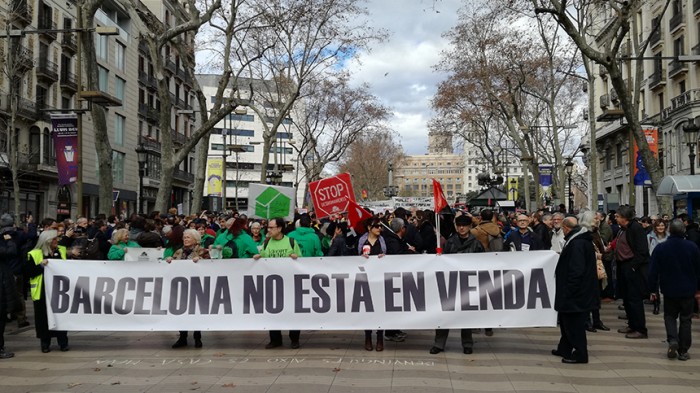Irene Escorihuela, Observatori DESC
Nowadays, European cities are facing enormous challenges. Social rights have suffered strong setbacks as a result of the economic crisis and its pro-austerity management. Civil and political rights are also threatened in this “fortress Europe”, while the extreme xenophobic right is thriving. In the meanwhile, cities are becoming places to visit or pass by where living is more difficult by the day.
Reaching a decent life in Europe’s villages and cities goes hand in hand with guaranteeing decent housing, particularly in a context of real estate speculation, and a rise in rents and evictions. In addition, cities should offer quality basic services and public management. A good and affordable public transportation system is also necessary in the face of congestion in cities, currently dealing with unsustainable pollution levels.
In Europe, the advance of the debates on basic income are unequal depending on each national government. The Right to the City should also include the fight for decent employment, one that stops job insecurity, fights salary inequality and stops criminalizing informal work. Poverty, malnutrition and substandard housing are ever-growing problems in our cities, while the current welfare approach does not make the shift towards a right-based policy approach. Discrimination and criminalization of poverty are widespread. The privatization of public space often contributes to this. It also contributes to a repressive and exclusive management of streets and open spaces, putting civility norms ahead of the co-creation of the urban commons and spaces for socialization, culture and leisure.
On the other hand, the destruction of neighborhoods and social networks as a consequence of tourism and gentrification expels neighbors from our cities because they cannot afford life there. The cosmopolitan, modern and cool city model has its drawback in the displacement of local residents and the fragmentation of community life. The GPR2C has to be used as a base to reclaim community life and citizens’ voice beyond investment funds and big fortunes that attempt to make our cities available only for the elite, make our jobs precarious and commercialize collective spaces. The GPR2C can join struggles, share experiences and strengthen a narrative in defense of sustainable and just neighborhoods and cities, in order to confront the big capital and the commoditization of social rights.





